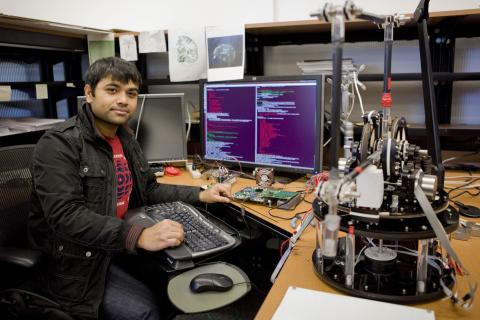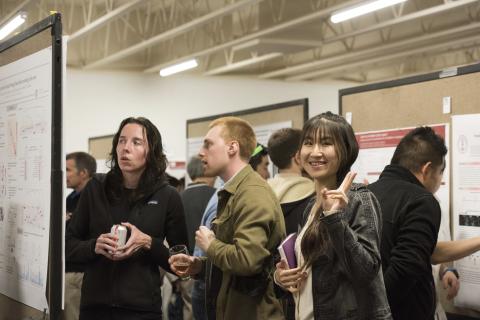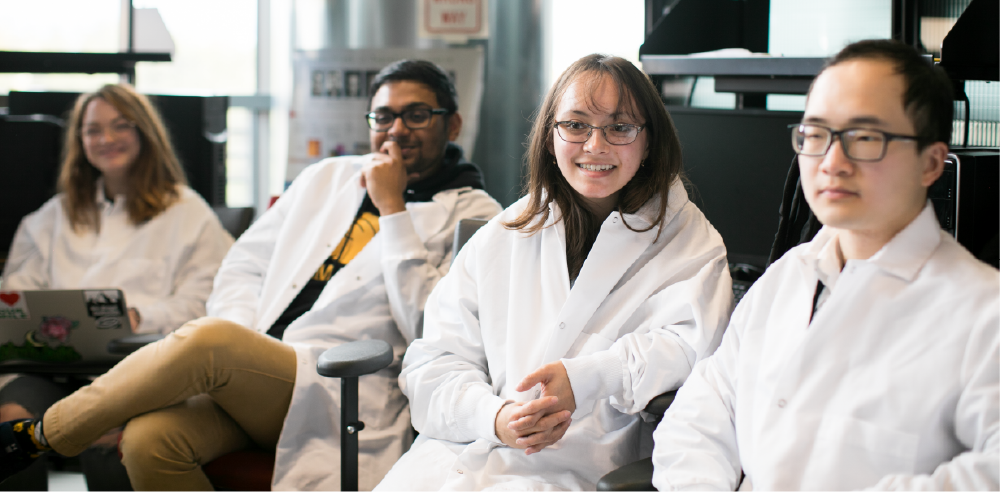With the conclusion of 7 years of support from the National Science Foundation Research Traineeship award program, the Stanford NeuroTech Training program is winding down and will not be accepting additional trainees. The Wu Tsai Neurosciences Institute continues to welcome trainees from technical and engineering disciplines into the fold of brain science. Stay tuned for additional programming in this area.
— Oct 20, 2025
Students bringing emerging technologies to advance neuroscience discovery and human health
The NeuroTech training program is designed to immerse first and second-year PhD students from technical disciplines including Electrical Engineering, BioEngineering, Mechanical Engineering, Computer Science, Statistics, Materials Science and Engineering, Applied Physics, and Physics into the emerging field of Neurotechnology. NeuroTech trainees spend two years immersed in coursework, research, seminars and travel opportunities designed to introduce them to the unique questions and challenges facing the field of neuroscience, so they can apply their technical skills to advancing neuroscience discovery and human health. Working together with NeuroTeach Cohort Mentors and fellow trainees, NeuroTech students prepare to tackle these challenges and become leaders in the emerging field of Neurotechnology.
To learn more about the Stanford NeuroEngineering community, please join our Wu Tsai Neurosciences Institute mailing list here for upcoming updates.
“Technology advances have revolutionized how we study the nervous system and how we treat brain disorders. We fully expect this trend to continue, and our training program is focused on bringing top talent from engineering, physics and other technical disciplines into neuroscience to make this future possible."
“Technology advances have revolutionized how we study the nervous system and how we treat brain disorders. We fully expect this trend to continue, and our training program is focused on bringing top talent from engineering, physics and other technical disciplines into neuroscience to make this future possible."
The Neurotech Experience
NeuroTech trainees:
- Have access to NeuroTech Cohort Mentorship to support their research project, scientific and technical training, and academic, professional and career goals
- Participate in NeuroTech Training Seminars to deepen neuroscience knowledge and practice scientific, communication, leadership, business and interpersonal skills;
- Engage in community building activities with their cohort.
Community Building and Engagement
The NeuroTech Training Program supports researchers from all backgrounds across the neurosciences. We are committed to supporting the success of students through a combination of mentorship and community building, and a commitment to aiding trainees in developing the skills needed to succeed in academia and industry. This includes providing opportunities for all students to learn more about the value of inclusive collaborations.
NeuroTech trainees have access to a variety of community engagement activities to aid them in building personal connections with other interdisciplinary scientists and achieving their research, training and career goals. See below for details on how to engage in these activities.
Seminars and symposia
The Wu Tsai Neurosciences Institute’s Center for Mind, Brain, Computation and Technology (MBCT) hosts a seminar series throughout the year and an annual Symposium that reflect the diversity of scientific approaches for studying the mind and brain. These scientific events include a mix of Stanford faculty, faculty from other institutions and researchers outside of academia.
Student leadership opportunities
Under the umbrella of the Center for Mind, Brain, Computation and Technology, NeuroTech students have the possibility of engaging in three committees:
- The Student Advisory Council, which has the goal of enabling greater student input into the direction of the center;
- The MBCT Seminar Series Committee, which takes the lead in soliciting speaker nominations from the community, inviting speakers and hosting their visits to campus. Additionally, students host the speakers for the annual Symposium.
- The MBCT Social Committee, which brings together students for fun and informal gatherings, including planning events with other interdisciplinary graduate training programs on campus.
Trainee support
NeuroTech trainees have access to a variety of professional development opportunities that aid them in building personal connections with other interdisciplinary scientists and achieving their research, training and career goals. See below for details on how to engage in these activities.
Mentorship
Each NeuroTech student is assigned one dedicated NeuroTech Cohort Mentor to receive complementary guidance and support.
Financial support
Over the course of the two-year program, all trainees in good standing receive $2,500 per year to use for research and/or travel expenses. These funds can be used to support travel to conferences or workshops and/or to offset any laboratory-related expenses.


